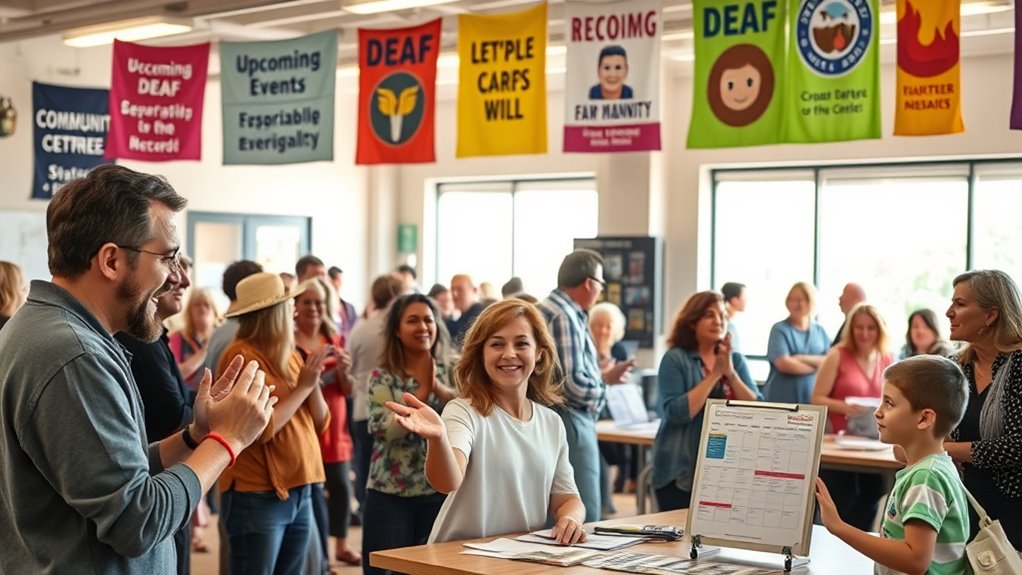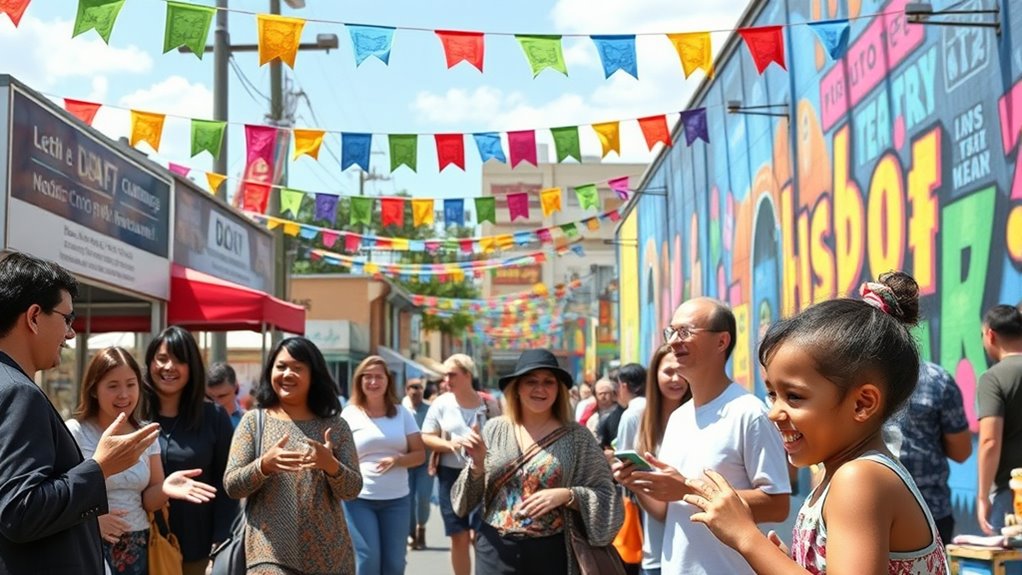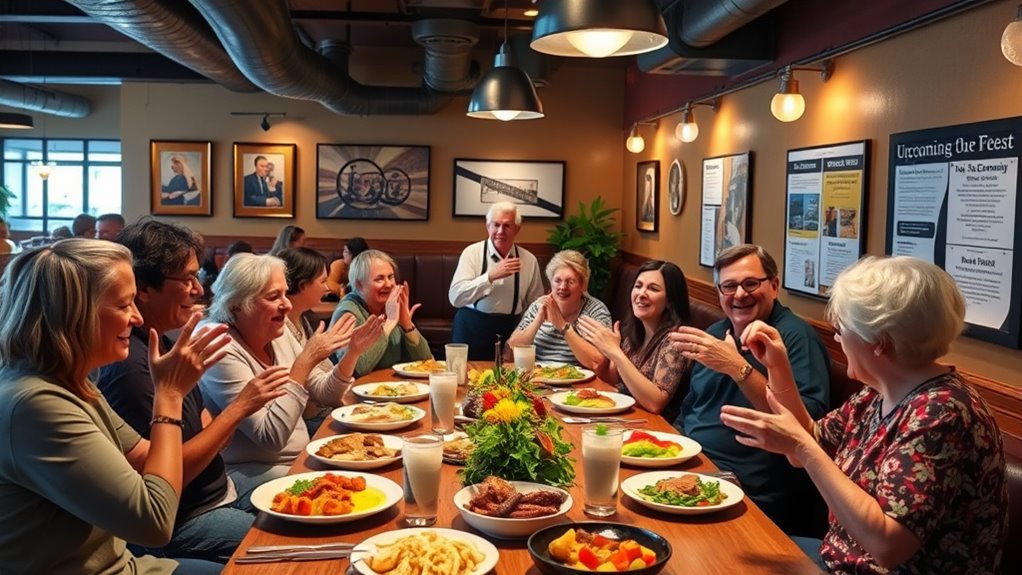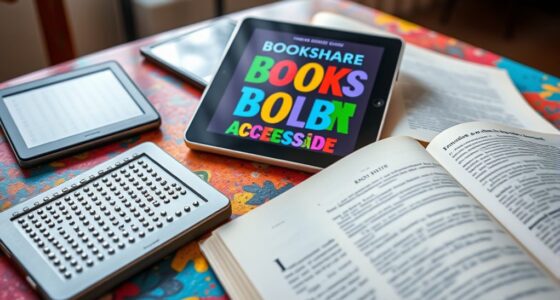To get involved in Deaf community events, start by checking local community centers for gatherings or classes, like Deaf-friendly cooking workshops or ASL Storytelling Nights. Attend Deaf cultural festivals or performances to connect with the community and learn about Deaf history. Utilize social media to network and find upcoming events. Don’t forget to engage with local organizations that support Deaf culture. Keep exploring to discover even more ways to participate and connect!
Key Takeaways
- Attend local Deaf events like ASL Storytelling Nights and Deaf theater performances to immerse yourself in Deaf culture and community activities.
- Participate in community engagement activities such as cooking classes and cultural festivals to connect with Deaf individuals and learn through shared experiences.
- Join organizations like the National Association of the Deaf (NAD) to network, advocate, and stay informed about Deaf rights and events.
- Utilize online resources to learn basic ASL and improve communication skills, fostering deeper connections within the Deaf community.
- Volunteer at Deaf-friendly events to support accessibility initiatives and gain firsthand experience of Deaf culture and community values.
Community Engagement Opportunities

One great way to engage with the deaf community is by participating in deaf-friendly cooking classes. These classes not only teach culinary skills but also foster connections and understanding among participants. You’ll get to experience deaf culture firsthand while having fun in the kitchen! Additionally, these classes often have qualified Deaf instructors, which enhances the learning experience and promotes authentic cultural exchange. Engaging in these activities can also help raise awareness about protecting seniors from financial scams, which is vital for ensuring their safety and well-being in the community. Furthermore, incorporating whole foods into cooking classes can promote healthier eating habits and nutritional awareness among participants. For example, you might learn to prepare a delicious fermented vegetable plate, which not only boosts gut health but also introduces you to diverse flavors. Participating in activities like these can also encourage early socialization and training, essential for fostering a supportive environment.
Deaf-Friendly Cooking Classes
Deaf-friendly cooking classes offer an engaging way for individuals to come together, share culinary skills, and celebrate Deaf culture. By incorporating American Sign Language (ASL), these classes create an inclusive environment for everyone. You’ll have the chance to exchange recipes and stories, fostering friendships and cultural understanding. Visual aids and adaptive tools make cooking accessible, ensuring that Deaf participants can thrive. Plus, these classes empower individuals to take leadership roles while teaching essential life skills like measurements and recipe following. Organizing events in venues with clear sightlines and utilizing ASL interpreters enhances communication, making it enjoyable for all. Additionally, the integration of ASL in the kitchen enriches educational experiences for both Deaf and hearing individuals. With a focus on natural materials in the kitchen, participants can also create a warm and inviting atmosphere for cooking. Freshly squeezed juices, which can be made during cooking classes, are known for their shorter shelf life compared to processed juices. Themed events like these can also provide opportunities for community bonding and networking among participants. Engaging in these classes can also promote healthy eating habits, encouraging participants to explore nutritious options together. Join a Deaf-friendly cooking class to experience the joy of community, culture, and creativity in the kitchen!
Deaf Community Hotspots

If you want to connect with the Deaf community, check out local community centers and gatherings where people come together to socialize and share experiences. Deaf history and culture is often celebrated and discussed in these spaces, fostering a sense of belonging. It’s also important to embrace the cultural impact of astrological signs in understanding how individuals relate to each other. Additionally, participating in these events can help mitigate emotional detachment that occurs in long-term relationships. Engaging in these gatherings promotes dynamic communication exercises that enhance understanding and connection between partners. Don’t overlook underrated local art spots that often showcase Deaf talent and culture. Furthermore, many of these events may include food preservation techniques that highlight the rich traditions of the community. Finally, make it a point to attend local Deaf theater performances for a unique cultural experience that celebrates ASL.
Community Centers and Gatherings
While exploring ways to engage with the Deaf community, you’ll find that community centers and gatherings serve as vibrant hotspots for connection and cultural exchange. These spaces, like the Rochester Institute of Technology and local Deaf clubs, offer opportunities for socializing and learning. Events such as Deaf Awareness Week and ASL Storytelling Nights further enrich your experience. Additionally, the Dyer Arts Center at RIT showcases Deaf and hard of hearing artists, highlighting the creative contributions of the community. Engaging in these activities promotes mental clarity and well-being through social interaction and cultural appreciation. Furthermore, these venues often incorporate accessibility features that ensure everyone can participate comfortably. Humor helps alleviate feelings of isolation in the community and can enhance social interactions. Participating in events at these centers can also introduce you to essential oils for respiratory health, which may support overall wellness.
Here’s a quick overview of key community aspects:
| Community Centers | Cultural Gatherings | Accessible Venues |
|---|---|---|
| RIT and NTID | Deaf Awareness Week | George Eastman Museum |
| Local Deaf Clubs | Deaf Film Festivals | Memorial Art Gallery |
| Deaf Organizations | ASL Storytelling Nights | Accessible Theaters |
Getting involved in these events can help you build meaningful connections and deepen your understanding of Deaf culture.
Underrated Local Art Spots
Exploring local art spots can open up new avenues for connecting with the Deaf community and appreciating its rich cultural expressions. Check out the Pyramid Atlantic Art Center, which showcases artworks by Deaf artists, including the annual *10X10 Invitational*. This event features fourteen pieces by eight Deaf artists, highlighting their unique perspectives and contributions to the art world. La Cosecha Gallery features exhibitions from Deaf Latin American artists, curated by Leticia Arellano. At the SOMArts Cultural Center, you can experience the “Bay Area Deaf Arts” exhibition, highlighting diverse talents. It’s essential to support these venues as they contribute to the overall cultural expressions of the Deaf community. Research shows that emotional manipulation can often impede relationships, making it vital to cultivate supportive environments. In a similar vein, the rise of sustainable fashion reflects a growing interest in ethical practices that resonate with community values, much like the art showcased in these spaces. Additionally, supporting local art initiatives can lead to unbeatable savings through community-based programs and events that celebrate artistic talent. Don’t miss the ASL Love Organization, which provides space for Deaf artists in the Bay Area. Gallaudet University’s Creativity Way also hosts events that bridge Deaf culture with neighboring communities, making these underrated spots essential for celebrating and engaging with Deaf artistic expression.
Attend Local Deaf Theater
Attending local Deaf theater is a fantastic way to immerse yourself in the vibrant culture and artistry of the Deaf community.
You’ll experience unique performances that beautifully integrate ASL and highlight Deaf stories, fostering understanding and inclusion. Additionally, you may find that culturally appropriate health services are offered at some events, promoting overall well-being for attendees. Furthermore, these performances often showcase the importance of color accuracy in visual presentations, enhancing the overall experience.
Here are three reasons to get involved:
- Cultural Connection: Engage with narratives that reflect Deaf experiences, enhancing cultural awareness.
- Community Engagement: Participate in events like workshops and festivals that strengthen bonds within the Deaf community. One such event is the upcoming CATS: The Musical, which features live captioning to ensure accessibility for all attendees.
- Accessibility: Enjoy ASL-interpreted performances and tools like captioning to guarantee everyone can participate fully.
Deaf-Friendly Dining Experiences

When it comes to Deaf-friendly dining experiences, you’ll find unique offerings like Deaf chef’s specialties that showcase culinary talent. Artisan wine tasting events and gourmet vegan tasting experiences not only highlight delicious food but also foster community connections. Engaging in these events enriches your understanding of Deaf culture while enjoying great flavors. Restaurants that are deaf-friendly make it easier for individuals with hearing loss to enjoy these culinary delights fully.
Deaf Chef’s Specialties
Deaf chefs bring a unique flair to the culinary scene, creating deaf-friendly dining experiences that cater to diverse tastes. They often incorporate their rich cultural backgrounds into innovative menus, making dining not just a meal but an experience. Deaf chef David Uzzell’s experience highlights the importance of seizing opportunities and showcasing talent in the culinary world. Here are three specialties you might love:
- Caribbean-inspired dishes that burst with flavor and are perfect for events.
- Greek cuisine, offering a variety of tastes that appeal to everyone.
- Creative food truck options, like hot dogs and Yorkshire pudding wraps, that grab attention at festivals.
Artisan Wine Tasting Events
Artisan wine tasting events offer a unique opportunity to indulge your palate while embracing the Deaf community’s rich culture. To make these events more inclusive, choose accessible venues and hire ASL interpreters for seamless communication. Use visual aids to enhance understanding and guarantee cultural sensitivity throughout the experience. By incorporating Deaf culture into the event planning, you can create a more authentic and enriching experience for all participants.
Here’s how you can enhance these events:
| Feature | Benefits | Implementation |
|---|---|---|
| ASL Workshops | Educate staff and attendees | Schedule before events |
| Deaf-Led Tours | Authentic insights from pros | Partner with Deaf professionals |
| Captioning Services | Improve accessibility | Provide during presentations |
| Interactive Sessions | Foster engagement | Host wine and ASL activities |
Gourmet Vegan Tasting Events
Exploring gourmet vegan tasting events opens up a delightful avenue for experiencing diverse flavors while fostering inclusivity within the Deaf community. These events are designed to create a welcoming atmosphere, ensuring everyone enjoys the culinary experience. Here are three essential elements to take into account:
- Deaf-Friendly Environment: Choose accessible venues and employ ASL interpreters for smooth communication.
- Culinary Workshops: Offer hands-on cooking sessions with ASL interpretation to engage participants actively. This enhances the experience by promoting cultural and linguistic understanding among attendees.
- Feedback Mechanisms: Implement channels for attendees to share their thoughts on accessibility and overall experience.
Must-See Sights

When you explore the Deaf community, don’t miss out on historic Deaf heritage sites that tell powerful stories. Make sure to check out Deaf cultural festivals, where you can immerse yourself in vibrant art and performances. These events, such as Deaflympics and various cultural festivals, celebrate the richness and diversity of Deaf culture while promoting social and linguistic rights. And if you want to connect even deeper, consider learning some basic sign language to enhance your experience.
Historic Deaf Heritage Sites
Historic Deaf heritage sites offer a unique glimpse into the rich tapestry of Deaf culture and history. Visiting these sites not only informs you about the past but also connects you to the vibrant Deaf community today. Here are three must-see locations:
- Martha’s Vineyard: Explore the self-guided tour that highlights its unique sign language and significant Deaf population in the 1800s. This location exemplifies how early Deaf communities thrived and communicated effectively.
- Indiana School for the Deaf: This historic landmark has played an essential role in Deaf education and culture since its establishment in 1843.
- American School for the Deaf: Founded by Thomas Hopkins Gallaudet in 1817, this site was vital in developing American Sign Language (ASL).
Don’t miss the chance to engage with this rich heritage!
Stunning National Parks
National parks captivate visitors with their breathtaking landscapes and diverse ecosystems, making them essential destinations for nature lovers. You’ll find everything from arid deserts to lush forests and towering mountains. Each park plays a crucial role in conservation, protecting unique wildlife and ecosystems. Popular spots like Acadia National Park, with its rugged coastline, and Grand Teton National Park, known for stunning mountain views, draw millions of visitors annually. You can enjoy various recreational activities, including hiking, camping, and white-water rafting at places like New River Gorge National Park. Fly Fishing the Cuyahoga River is also a unique experience in Cuyahoga Valley National Park, allowing anglers to enjoy a safe and beautiful fishing environment. Don’t miss the chance to explore educational programs and guided tours that enhance your experience, ensuring you leave with lasting memories of these magnificent natural wonders.
Deaf Cultural Festivals
Deaf cultural festivals offer a vibrant celebration of community, art, and expression that you won’t want to miss.
These events showcase the creativity and talent of the Deaf community while fostering connection and awareness.
Here are three must-see sights at these festivals:
- Visual Vernacular Performances: Experience unique storytelling that captivates through expressive movement and sign language.
- Sign Language Poetry: Enjoy linguistic creativity that highlights the beauty of Deaf culture in an artistic format.
- Deaf Art Exhibitions: Discover the remarkable works of Deaf artists, showcasing their perspectives and experiences.
Attending these festivals not only enriches your understanding but also allows you to support and engage with the Deaf community in a fun and meaningful way! Additionally, many festivals, like the Deaf Oktoberfest, attract participants from around the world, creating a truly international atmosphere.
Learn Basic Sign Language
Getting started with basic sign language opens up a world of communication and connection. You can find online resources like Handspeak and ASL University to explore signs through video tutorials. Consider taking courses from Start ASL that fit your skill level and schedule. Don’t forget to check out ASL dictionaries for specific signs. Engaging in ASL Storytimes or attending Deaf events allows you to practice your skills in real-life settings. Workshops and storytelling sessions further enhance your learning experience. Focus on mastering the ASL alphabet, family signs, greetings, and basic phrases. Understanding Deaf culture is essential for effective communication in ASL, so be sure to immerse yourself in it. Join Deaf socials and online groups for immersion and support. With consistent practice and community involvement, you’ll gain confidence in your ASL abilities.
Practical Tips

When you’re planning to attend Deaf community events, you’ll want to know the best ways to get there and get around. Consider the timing of your visit to make the most of your experience, and think about where you’ll stay to feel comfortable. Also, being aware of local etiquette can help you connect better with the community. Engaging in Deaf community activities can significantly enhance your understanding of Deaf culture and foster meaningful connections.
Getting There
To make attending Deaf community events easier, planning ahead is essential. Consider these practical tips:
- Utilize Public Transportation: Familiarize yourself with buses, light rails, and other options that have accessibility features, like visual announcements and priority seating. Public transportation falls under the ADA, ensuring equal access for Deaf riders.
- Use Technology: Download apps like Moovit for real-time updates and take advantage of SMS alerts for disruptions. Information screens at transit hubs can also keep you informed.
- Explore Para-Transit Services: Check out options like Dial-a-Ride for curb-to-curb service, often at reduced rates for Deaf individuals.
Getting Around
Maneuvering public transportation can be straightforward if you know the tools available to you. Familiarize yourself with buses, subways, and trains that offer accessible features like visual announcements and priority seating. Sufficient techniques ensure that accessibility features are effectively implemented, making it easier for all users to navigate. Remember, you don’t have to use priority seating, but it’s there if you need it. Look for SMS alert systems to stay updated on delays or emergencies.
Utilize apps that provide text communication and accessible navigation. Don’t hesitate to ask transportation staff for help—they should be trained to communicate effectively with you. If you require additional support, consider using para-transit services for curb-to-curb transportation. Always check for visual displays and accessible signage to enhance your travel experience within the Deaf community.
Best Time to Visit
Choosing the right time to engage with the Deaf community can significantly enhance your experience. By aligning your visit with key events, you’ll find a more vibrant and welcoming atmosphere.
Here are some practical tips to keep in mind:
- Participate during Deaf History Month (March) for a rich cultural experience.
- Join in Deaf Awareness Week (last full week of September) to celebrate and learn about Deaf culture.
- Attend National ASL Day (January) to honor the beauty of American Sign Language. Events like these not only provide opportunities for social interaction but also help to celebrate and preserve deaf culture.
Planning around these events guarantees you connect with the community meaningfully while avoiding scheduling conflicts.
Plus, it’s a great way to engage with various activities and learn more about Deaf culture. Don’t miss out!
Where to Stay
Finding the right place to stay can make all the difference when attending Deaf community events.
Look for accommodations that offer ADA-compliant rooms with features like roll-in showers and kits for Deaf and hard of hearing guests, including visual smoke detectors. Verify the hotel has accessible public areas, like restaurants and lobbies, too.
Proximity to event venues is vital—staying close reduces travel time. When booking, confirm the availability of chemical-free rooms if needed. Additionally, ensure that the hotel has clear communication channels for accommodating requests, as this will facilitate any necessary arrangements.
Additionally, check if the event venue has wheelchair-accessible entrances and clear signage. Don’t forget to inquire about ASL interpreters and captioning services for sessions.
These considerations will enhance your experience and accessibility during the event.
Local Etiquette
When attending Deaf community events, understanding local etiquette can greatly enhance your experience and interactions. Here are some practical tips to keep in mind:
- Get Attention Respectfully: Use a gentle tap on the shoulder or a wave to gain someone’s attention instead of shouting or waving your hands wildly.
- Communicate Directly: When speaking with a Deaf person, always address them directly, not the interpreter. This fosters respect and connection, as Deaf culture emphasizes the importance of direct communication.
- Maintain Eye Contact: Keep eye contact while communicating. Breaking it can be seen as rude, so stay engaged and attentive.
Pro Tip
Understanding local etiquette is just the beginning of your journey into the Deaf community.
To deepen your involvement, attend Deaf events regularly; this is where you can practice ASL and forge connections. Joining organizations like the National Association of the Deaf (NAD) can also enhance your understanding and engagement. Encouraging open dialogue with event organizers about accessibility needs is crucial to fostering inclusion.
Consider volunteering for Deaf groups or schools to gain meaningful experiences. Use social media to connect with Deaf individuals and share resources. Always advocate for Deaf rights and accessibility—this strengthens your ties to the community.
Finally, immerse yourself in Deaf culture through films and performances. Remember, clear communication and respectful interactions are key; address Deaf individuals directly, not through interpreters.
Frequently Asked Questions
How Can I Learn Basic Sign Language for Events?
To learn basic sign language for events, start with the manual alphabet and practice fingerspelling.
You’ll want to build a basic vocabulary, focusing on common greetings and introductions. Regular practice is key, so use online resources like YouTube tutorials or ASL apps.
Engage with Deaf culture by understanding etiquette and observing interactions. This’ll help you feel more confident when communicating during events, making your experience more enjoyable and meaningful.
Are There Age-Specific Events for Children or Seniors?
Imagine a garden where children and seniors bloom side by side, each needing their unique sunlight and care.
Yes, there are age-specific events designed for both groups. Children can enjoy activities focused on ASL and friendship, while seniors can engage in broader community events that celebrate Deaf culture.
Just like plants, both generations thrive when they’re nurtured within their particular environments, fostering connections that enrich the entire Deaf community.
What Should I Do if I’m Not Fluent in Sign Language?
If you’re not fluent in sign language, don’t worry! Start by taking ASL classes to build your skills.
Attend Deaf community events to immerse yourself in the language and culture. You can practice with Deaf individuals, who often appreciate your effort.
Use clear speech, visual cues, and written communication to interact. Remember, everyone’s learning journey is different, and showing your willingness to learn fosters meaningful connections in the community.
Can I Volunteer at Deaf Community Events Without Prior Experience?
Absolutely, you can volunteer at Deaf community events without prior experience!
Many organizations welcome newcomers and provide training to help you get started. Your willingness to learn and engage with the community is what matters most.
Just be open to understanding Deaf culture and the unique needs of the community.
How Do I Find Out About Last-Minute Events?
To find out about last-minute events, you can start by checking social media platforms like Facebook and Instagram.
Search for “Deaf” along with your city’s name and join groups focused on Deaf culture. Follow Deaf influencers for updates, and engage with their posts.
Additionally, reach out to local Deaf organizations for event calendars, and participate in community meetings to stay connected and informed about any spontaneous gatherings happening in your area.
Conclusion
Getting involved in the deaf community opens up a vibrant world of connection and understanding. By attending events, visiting deaf-friendly hotspots, and savoring inclusive dining experiences, you’ll weave yourself into the fabric of this rich culture. Think of it as planting seeds in a garden; with time and care, you’ll witness friendships blossom and grow. So step out, embrace the sights, and let your journey unfold—there’s a whole community waiting to welcome you!










